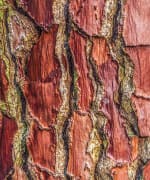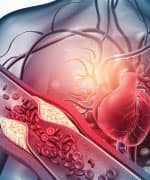Life Extension Magazine®
Normal aging, along with cardiovascular risk factors, cause a buildup of plaque inside arteries called atherosclerosis.

As these plaques grow, they choke off blood flow.
If they rupture and/or cause a blood clot, a heart attack or stroke may result.
New human data corroborate that two plant extracts help control the progression of atherosclerosis and reduce risk of adverse cardiovascular events.1-4
In a three-year study, 22% of control subjects had a major cardiovascular event like a heart attack or stroke.
In the group taking the plant extracts plus low-dose aspirin, less than 4% suffered a major cardiovascular event.1
Human studies published in 2020 corroborate these findings.
Atherosclerosis and Cardiovascular Disease

Every year, about 660,000 Americans die from heart disease.5
Most cardiovascular disease is driven by atherosclerosis, that causes arteries to narrow and reduce blood flow.6
Atherosclerotic plaque in the coronary arteries can lead to chest pain, need for stenting or bypass procedures, and/or heart attack.
Atherosclerosis can also cause abnormal blood clots to form inside of arteries.
When a clot blocks a coronary artery, a heart attack results. When an artery supplying blood to the brain is blocked by a clot, it leads to a stroke.
Risk factors for the development of atherosclerosis and cardiovascular disease include:6,7
- Advancing age,
- High blood pressure,
- Abnormal blood lipid levels, including elevated LDL cholesterol, high triglycerides, and low HDL cholesterol,
- Elevated blood glucose,
- Obesity and sedentary lifestyle,
- Poor diet,
- Smoking, and
- Family history of cardiovascular disease.
Two Plant Extracts That Help
Centella asiatica (also known as Gotu Kola) is an herbaceous flowering plant native to Asia. It has been used in traditional medicine for various disorders and to treat wounds.8
Extracts from the Centella plant contain compounds which have anti-inflammatory properties called triterpenes.9
French maritime pine bark extract was first studied more than 50 years ago. Like Centella, it contains antioxidant and anti-inflammatory compounds that promote arterial health.
Fighting Atherosclerosis

Two clinical trials were conducted using Centella asiatica and French maritime pine bark on people with atherosclerosis but no symptoms.3,4
In both studies, researchers separated subjects into a number of groups. Each group received a different treatment including aspirin alone (or a similar medication if aspirin-intolerant), varying doses of French maritime pine bark alone, French maritime pine bark with aspirin, or French maritime pine bark and Centella (100 mg of each daily).
All patients also received standard management care, which included being advised on exercise and diet.
In one of these studies, the patients started with relatively small plaques. Atherosclerotic plaque buildup significantly worsened in the standard management group, the low dose (50 mg daily) of French maritime pine bark group, and aspirin alone group.3
In the groups that received 100 mg of French maritime pine bark each day, alone or with aspirin, there was significantly less progression of plaque buildup than in those with only standard management or aspirin alone.
The greatest response was seen with the combination of pine bark and Centella. While 21.3% of plaques of those in the standard management group worsened to a more severe Class V, only 1.1% of plaques worsened in individuals receiving the Centella and French maritime pine bark.
The second trial evaluated advanced Class V plaques that were blocking at least 50% of the diameter of the artery.4
In the standard management group, nearly 50% of subjects progressed to the point of having symptoms during 42 months of follow-up. The rate of progression was 7.4 times lower in the group receiving French maritime pine bark and Centella.
What’s more, 16% of those receiving standard care had a significant cardiovascular event (such as hospitalization for chest pain, heart attack, or stroke), compared to only 4.4% of the combination (French maritime pine bark and Centella) group.
Stabilizing Plaques
A number of other studies have demonstrated the benefits for atherosclerosis of these plant extracts.1,2,10-13
In one study, scientists prescribed 150 mg of French maritime pine bark and 450 mg of Centella daily for patients with asymptomatic complex atherosclerotic plaques and atherosclerosis risk factors (mildly high blood pressure and elevated cholesterol).11
They used a type of ultrasound to evaluate athero-sclerotic plaque structure.11 This allowed them to identify which plaques were more stable and less likely to progress or rupture and lead to acute heart attacks.
In patients who received standard management, plaque structure and stability did not change significantly over six months. In those taking the plant extracts, the index of plaque stability doubled, meaning the atherosclerotic plaques were more stable, less likely to form arterial clots, and less likely to acutely rupture.
Plaque thickness, length, and overall number of plaques also decreased significantly in the treatment group. This indicates that French maritime pine bark and Centella can slow the progression of atherosclerosis, even in the presence of risk factors.
Protecting Stented Arteries
Patients with a narrowed or blocked coronary artery often undergo angioplasty and stenting. In this technique, a balloon is used to expand the artery and a metal stent holds it open.
But the diseased artery can continue to progress, and plaque can redevelop over time.
In a year-long study, researchers evaluated whether atherosclerotic plaque progression in stented arteries could be prevented with a French maritime pine bark-Centella blend.10
Subjects with standard management had their plaques progress in almost 60% of cases, but only 9% progressed in people treated with the French maritime pine bark + Centella blend.
What you need to know

Fighting Atherosclerosis and Heart Disease
- An extract of Centella asiatica, an herb native to Asia, has long been used in traditional medicine. An extract of bark from the French maritime pine tree also has many established health benefits.
- Together, these two extracts work synergistically, making their benefit greater than either nutrient alone.
- Clinical studies show that the combination of Centella and French maritime pine bark can slow or even reverse atherosclerosis. This buildup of plaque in arteries is responsible for most cardiovascular disease.
- In studies, this combination significantly reduces the rate of hospitalizations from heart attacks or strokes compared to standard management.
New Studies Published in 2020

In 2020, the results of two more trials were published. Both used a combination of 150 mg of French maritime pine bark and 450 mg of Centella daily plus 100 mg of low-dose aspirin.1,2
One study followed asymptomatic patients with atherosclerotic plaque over a period of three years.1
All subjects received standard management, which included diet, exercise, and lifestyle counseling. One group received no additional treatment, a second took 100 mg/day of aspirin, and a third received the aspirin + French maritime pine bark + Centella extracts.
In subjects who only received standard management, 22% had major cardiovascular events like a heart attack or stroke, requiring hospitalization. Fewer than 4% of those taking the plant extracts + aspirin did.1
The progression of plaques was halted in the group receiving the plant extracts, while the plaques in the other two groups worsened.
In the second study, researchers looked at the presence of calcification—calcium deposits that can be associated with more high-risk plaques—in the coronary arteries of asymptomatic individuals.2,14
For this study, all subjects received standard diet, exercise, and lifestyle counseling and took 100 mg/a day of aspirin.
Calcification increased by 35% over 12 months in those with standard management. Those taking the French pine bark + Centella extracts had a 10% reduction in number of calcifications.
Summary
Cardiovascular disease is the leading cause of death in the U.S. It is most often the result of atherosclerosis.
Clinical evidence has found that a combination of French maritime pine bark + Centella asiatica extracts (alone or with aspirin) can significantly slow the development and progression of atherosclerotic plaque.
This combination also reduces heart attacks, strokes, and other cardiovascular events associated with atherosclerosis and heart disease.
If you have any questions on the scientific content of this article, please call a Life Extension® Wellness Specialist at 1-866-864-3027.
References
- Belcaro G, Cesarone MR, Scipione C, et al. Delayed progression of atherosclerosis and cardiovascular events in asymptomatic patients with atherosclerotic plaques: 3-year prevention with the supplementation with Pycnogenol(R)+Centellicum(R). Minerva Cardioangiol. 2020 Feb;68(1):15-21.
- Hu S, Belcaro G, Cesarone MR, et al. Central cardiovascular calcifications: supplementation with Pycnogenol(R) and Centellicum(R): variations over 12 months. Minerva Cardioangiol. 2020 Feb;68(1):22-6.
- Belcaro G, Dugall M, Hosoi M, et al. Pycnogenol(R) and Centella Asiatica for asymptomatic atherosclerosis progression. Int Angiol. 2014 Feb;33(1):20-6.
- Belcaro G, Ippolito E, Dugall M, et al. Pycnogenol(R) and Centella asiatica in the management of asymptomatic atherosclerosis progression. Int Angiol. 2015 Apr;34(2):150-7.
- Available at: https://www.cdc.gov/nchs/fastats/leading-causes-of-death.htm. Accessed August 25, 2021.
- Available at: https://www.ncbi.nlm.nih.gov/books/NBK535419/. Accessed August 25, 2021.
- Ruan Y, Guo Y, Zheng Y, et al. Cardiovascular disease (CVD) and associated risk factors among older adults in six low-and middle-income countries: results from SAGE Wave 1. BMC public health. 2018;18(1):778-.
- Gohil KJ, Patel JA, Gajjar AK. Pharmacological Review on Centella asiatica: A Potential Herbal Cure-all. Indian J Pharm Sci. 2010 Sep;72(5):546-56.
- Sun B, Wu L, Wu Y, et al. Therapeutic Potential of Centella asiatica and Its Triterpenes: A Review. Front Pharmacol. 2020 2020-September-04;11(1373):568032.
- Belcaro G, Cesarone MR, Scipione C, et al. Pycnogenol(R)+Centellicum(R), post-stent evaluation: prevention of neointima and plaque re-growth. Minerva Cardioangiol. 2019 Dec;67(6):450-5.
- Belcaro G, Cornelli U. Variations in Echogenicity in Carotid and Femoral Atherosclerotic Plaques with Pycnogenol + Centella Asiatica Supplementation. Int J Angiol. 2017 Jun;26(2):95-101.
- Belcaro G, Dugall M, Ippolito E, et al. Pycnogenol(R) and Centella asiatica to prevent asymptomatic atherosclerosis progression in clinical events. Minerva Cardioangiol. 2017 Feb;65(1):24-31.
- Luzzi R, Belcaro G, Ippolito E. Carotid plaque stabilization induced by the supplement association Pycnogenol(R) and centella asiatica (Centellicum(R)). Minerva Cardioangiol. 2016 Dec;64(6):603-9.
- Shi X, Gao J, Lv Q, et al. Calcification in Atherosclerotic Plaque Vulnerability: Friend or Foe? Front Physiol. 2020;11:56.

